The Ketogenic Diet and Type 2 Diabetes Management in Adults
VerifiedAdded on 2022/12/28
|28
|8479
|107
Report
AI Summary
This report explores the benefits of ketogenic and low-carbohydrate diets in managing type 2 diabetes in adults. It emphasizes the prevalence of type 2 diabetes in the UK and the potential of dietary changes, including ketogenic diets, to improve health outcomes by lowering blood sugar levels and reducing the need for medication. The report discusses the principles of ketogenic diets, including high-fat, moderate-protein, and low-carbohydrate intake, and their impact on insulin sensitivity and blood pressure. It reviews methodologies like systematic reviews and Boolean operator search strategies for gathering relevant articles from databases such as PUBMED and Google Scholar. The report also highlights the inclusion and exclusion criteria used, the PICO question guiding the research, and the potential side effects of the ketogenic diet. The study aims to educate patients on the benefits of nutritional management and to improve their health outcomes, with a focus on the impact of dietary changes on overall well-being.
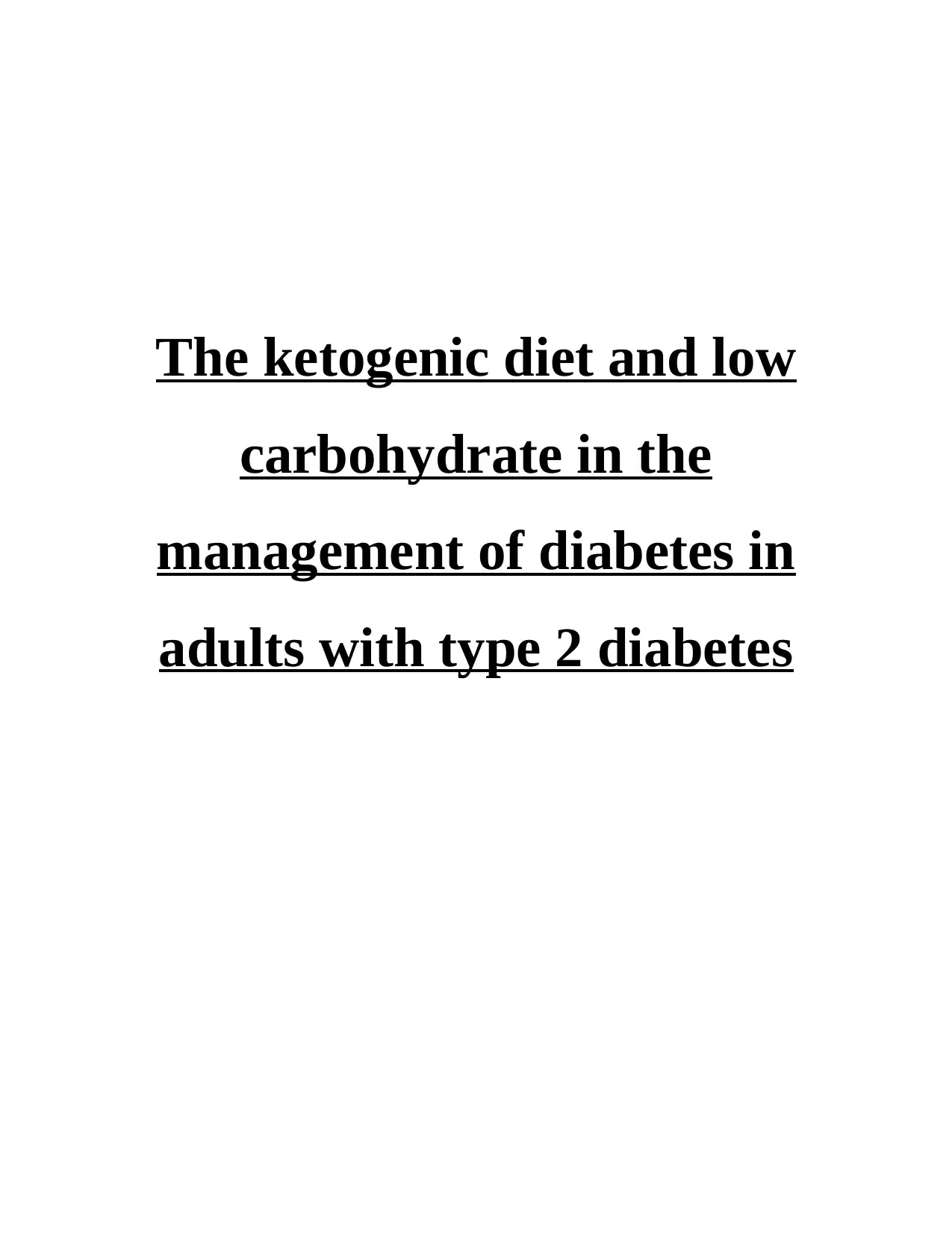
The ketogenic diet and low
carbohydrate in the
management of diabetes in
adults with type 2 diabetes
carbohydrate in the
management of diabetes in
adults with type 2 diabetes
Paraphrase This Document
Need a fresh take? Get an instant paraphrase of this document with our AI Paraphraser
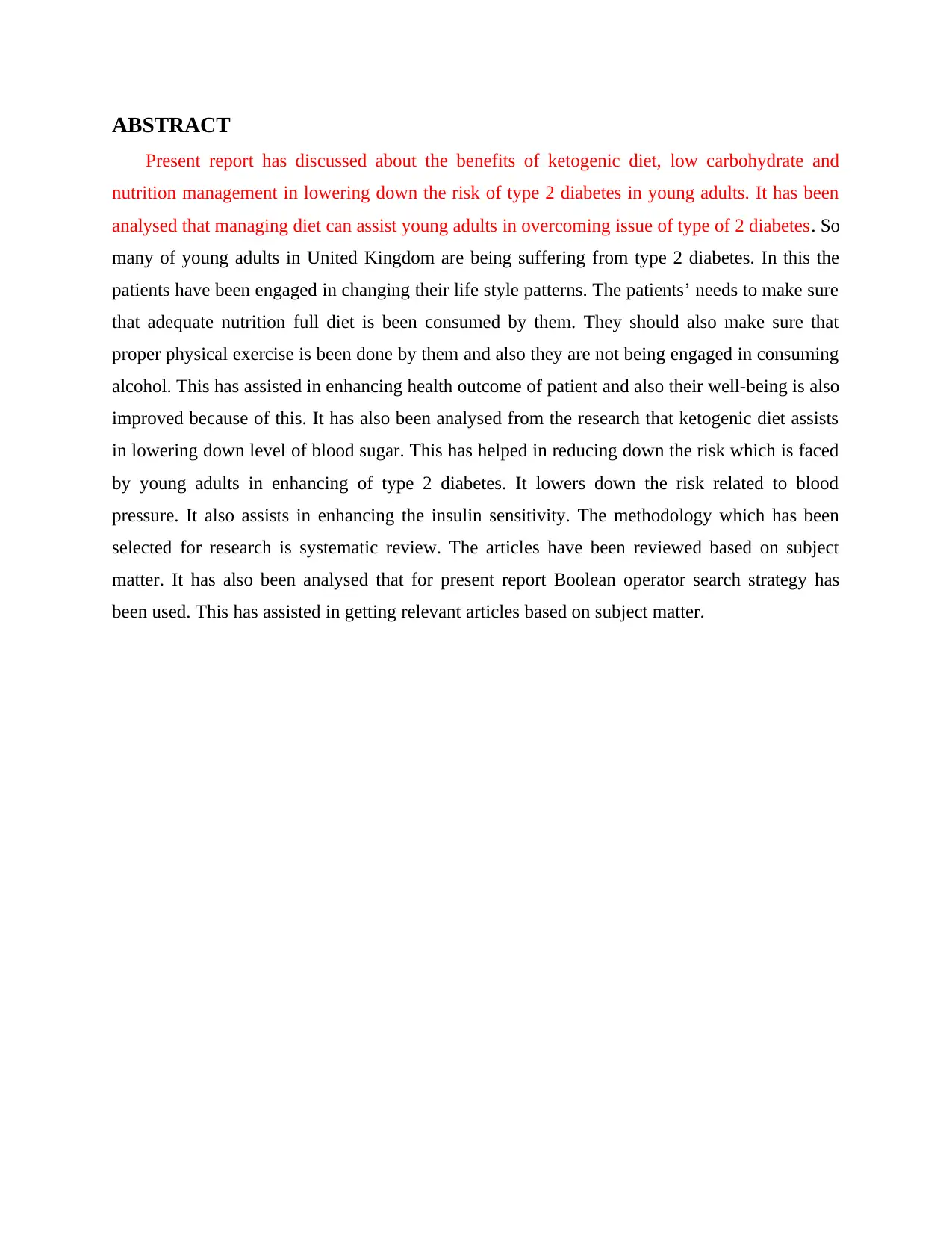
ABSTRACT
Present report has discussed about the benefits of ketogenic diet, low carbohydrate and
nutrition management in lowering down the risk of type 2 diabetes in young adults. It has been
analysed that managing diet can assist young adults in overcoming issue of type of 2 diabetes. So
many of young adults in United Kingdom are being suffering from type 2 diabetes. In this the
patients have been engaged in changing their life style patterns. The patients’ needs to make sure
that adequate nutrition full diet is been consumed by them. They should also make sure that
proper physical exercise is been done by them and also they are not being engaged in consuming
alcohol. This has assisted in enhancing health outcome of patient and also their well-being is also
improved because of this. It has also been analysed from the research that ketogenic diet assists
in lowering down level of blood sugar. This has helped in reducing down the risk which is faced
by young adults in enhancing of type 2 diabetes. It lowers down the risk related to blood
pressure. It also assists in enhancing the insulin sensitivity. The methodology which has been
selected for research is systematic review. The articles have been reviewed based on subject
matter. It has also been analysed that for present report Boolean operator search strategy has
been used. This has assisted in getting relevant articles based on subject matter.
Present report has discussed about the benefits of ketogenic diet, low carbohydrate and
nutrition management in lowering down the risk of type 2 diabetes in young adults. It has been
analysed that managing diet can assist young adults in overcoming issue of type of 2 diabetes. So
many of young adults in United Kingdom are being suffering from type 2 diabetes. In this the
patients have been engaged in changing their life style patterns. The patients’ needs to make sure
that adequate nutrition full diet is been consumed by them. They should also make sure that
proper physical exercise is been done by them and also they are not being engaged in consuming
alcohol. This has assisted in enhancing health outcome of patient and also their well-being is also
improved because of this. It has also been analysed from the research that ketogenic diet assists
in lowering down level of blood sugar. This has helped in reducing down the risk which is faced
by young adults in enhancing of type 2 diabetes. It lowers down the risk related to blood
pressure. It also assists in enhancing the insulin sensitivity. The methodology which has been
selected for research is systematic review. The articles have been reviewed based on subject
matter. It has also been analysed that for present report Boolean operator search strategy has
been used. This has assisted in getting relevant articles based on subject matter.
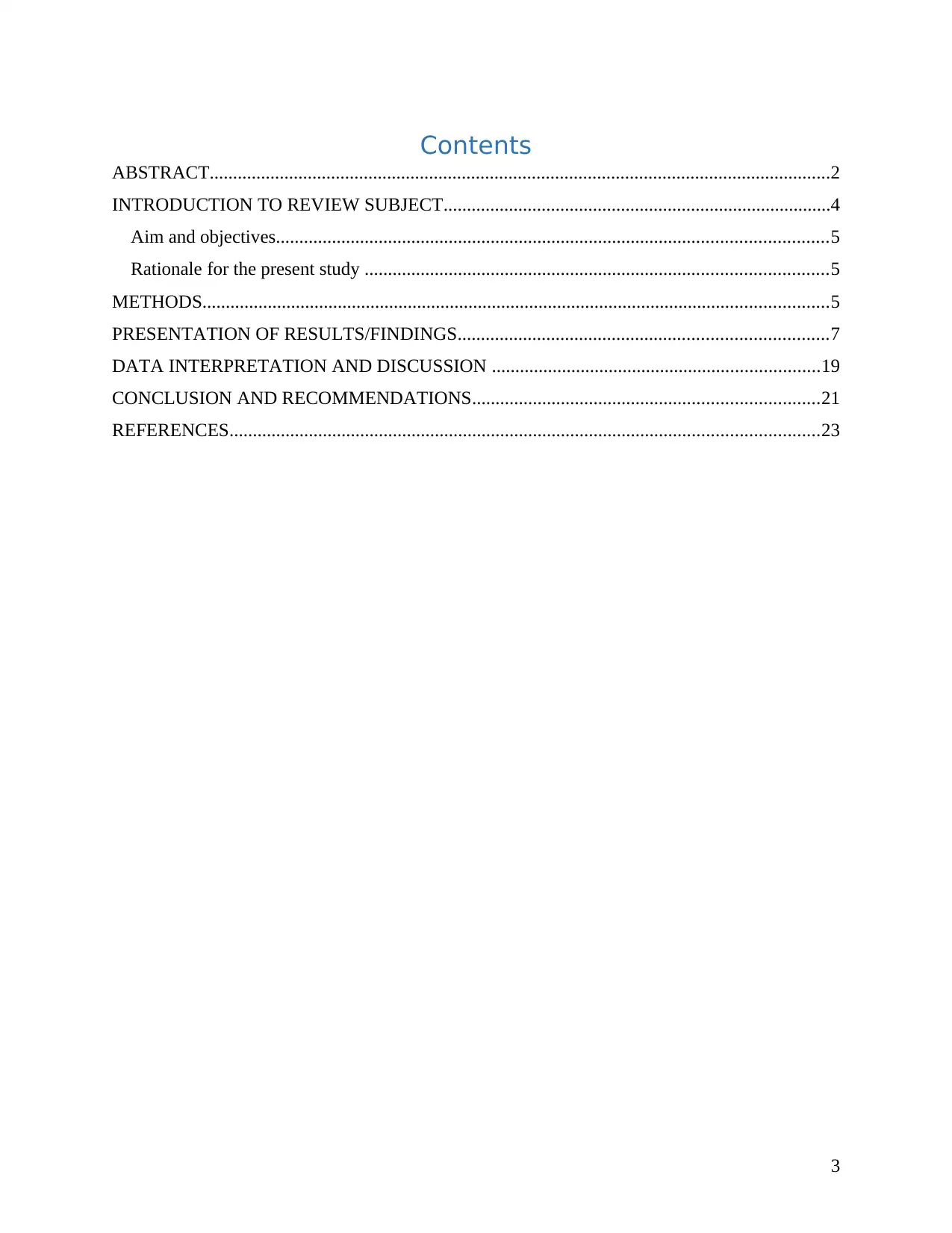
Contents
ABSTRACT.....................................................................................................................................2
INTRODUCTION TO REVIEW SUBJECT...................................................................................4
Aim and objectives......................................................................................................................5
Rationale for the present study ...................................................................................................5
METHODS......................................................................................................................................5
PRESENTATION OF RESULTS/FINDINGS...............................................................................7
DATA INTERPRETATION AND DISCUSSION ......................................................................19
CONCLUSION AND RECOMMENDATIONS..........................................................................21
REFERENCES..............................................................................................................................23
3
ABSTRACT.....................................................................................................................................2
INTRODUCTION TO REVIEW SUBJECT...................................................................................4
Aim and objectives......................................................................................................................5
Rationale for the present study ...................................................................................................5
METHODS......................................................................................................................................5
PRESENTATION OF RESULTS/FINDINGS...............................................................................7
DATA INTERPRETATION AND DISCUSSION ......................................................................19
CONCLUSION AND RECOMMENDATIONS..........................................................................21
REFERENCES..............................................................................................................................23
3
⊘ This is a preview!⊘
Do you want full access?
Subscribe today to unlock all pages.

Trusted by 1+ million students worldwide
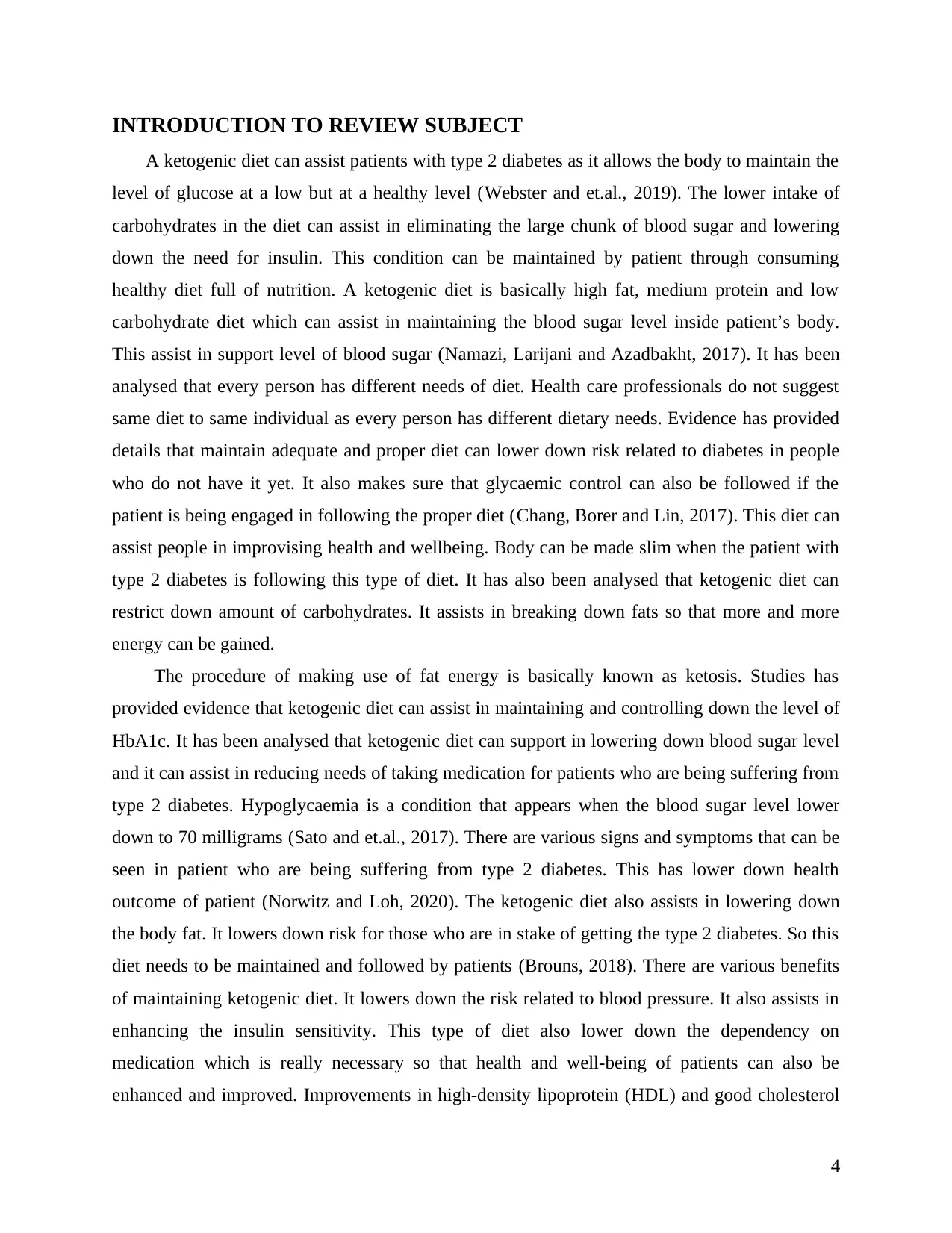
INTRODUCTION TO REVIEW SUBJECT
A ketogenic diet can assist patients with type 2 diabetes as it allows the body to maintain the
level of glucose at a low but at a healthy level (Webster and et.al., 2019). The lower intake of
carbohydrates in the diet can assist in eliminating the large chunk of blood sugar and lowering
down the need for insulin. This condition can be maintained by patient through consuming
healthy diet full of nutrition. A ketogenic diet is basically high fat, medium protein and low
carbohydrate diet which can assist in maintaining the blood sugar level inside patient’s body.
This assist in support level of blood sugar (Namazi, Larijani and Azadbakht, 2017). It has been
analysed that every person has different needs of diet. Health care professionals do not suggest
same diet to same individual as every person has different dietary needs. Evidence has provided
details that maintain adequate and proper diet can lower down risk related to diabetes in people
who do not have it yet. It also makes sure that glycaemic control can also be followed if the
patient is being engaged in following the proper diet (Chang, Borer and Lin, 2017). This diet can
assist people in improvising health and wellbeing. Body can be made slim when the patient with
type 2 diabetes is following this type of diet. It has also been analysed that ketogenic diet can
restrict down amount of carbohydrates. It assists in breaking down fats so that more and more
energy can be gained.
The procedure of making use of fat energy is basically known as ketosis. Studies has
provided evidence that ketogenic diet can assist in maintaining and controlling down the level of
HbA1c. It has been analysed that ketogenic diet can support in lowering down blood sugar level
and it can assist in reducing needs of taking medication for patients who are being suffering from
type 2 diabetes. Hypoglycaemia is a condition that appears when the blood sugar level lower
down to 70 milligrams (Sato and et.al., 2017). There are various signs and symptoms that can be
seen in patient who are being suffering from type 2 diabetes. This has lower down health
outcome of patient (Norwitz and Loh, 2020). The ketogenic diet also assists in lowering down
the body fat. It lowers down risk for those who are in stake of getting the type 2 diabetes. So this
diet needs to be maintained and followed by patients (Brouns, 2018). There are various benefits
of maintaining ketogenic diet. It lowers down the risk related to blood pressure. It also assists in
enhancing the insulin sensitivity. This type of diet also lower down the dependency on
medication which is really necessary so that health and well-being of patients can also be
enhanced and improved. Improvements in high-density lipoprotein (HDL) and good cholesterol
4
A ketogenic diet can assist patients with type 2 diabetes as it allows the body to maintain the
level of glucose at a low but at a healthy level (Webster and et.al., 2019). The lower intake of
carbohydrates in the diet can assist in eliminating the large chunk of blood sugar and lowering
down the need for insulin. This condition can be maintained by patient through consuming
healthy diet full of nutrition. A ketogenic diet is basically high fat, medium protein and low
carbohydrate diet which can assist in maintaining the blood sugar level inside patient’s body.
This assist in support level of blood sugar (Namazi, Larijani and Azadbakht, 2017). It has been
analysed that every person has different needs of diet. Health care professionals do not suggest
same diet to same individual as every person has different dietary needs. Evidence has provided
details that maintain adequate and proper diet can lower down risk related to diabetes in people
who do not have it yet. It also makes sure that glycaemic control can also be followed if the
patient is being engaged in following the proper diet (Chang, Borer and Lin, 2017). This diet can
assist people in improvising health and wellbeing. Body can be made slim when the patient with
type 2 diabetes is following this type of diet. It has also been analysed that ketogenic diet can
restrict down amount of carbohydrates. It assists in breaking down fats so that more and more
energy can be gained.
The procedure of making use of fat energy is basically known as ketosis. Studies has
provided evidence that ketogenic diet can assist in maintaining and controlling down the level of
HbA1c. It has been analysed that ketogenic diet can support in lowering down blood sugar level
and it can assist in reducing needs of taking medication for patients who are being suffering from
type 2 diabetes. Hypoglycaemia is a condition that appears when the blood sugar level lower
down to 70 milligrams (Sato and et.al., 2017). There are various signs and symptoms that can be
seen in patient who are being suffering from type 2 diabetes. This has lower down health
outcome of patient (Norwitz and Loh, 2020). The ketogenic diet also assists in lowering down
the body fat. It lowers down risk for those who are in stake of getting the type 2 diabetes. So this
diet needs to be maintained and followed by patients (Brouns, 2018). There are various benefits
of maintaining ketogenic diet. It lowers down the risk related to blood pressure. It also assists in
enhancing the insulin sensitivity. This type of diet also lower down the dependency on
medication which is really necessary so that health and well-being of patients can also be
enhanced and improved. Improvements in high-density lipoprotein (HDL) and good cholesterol
4
Paraphrase This Document
Need a fresh take? Get an instant paraphrase of this document with our AI Paraphraser
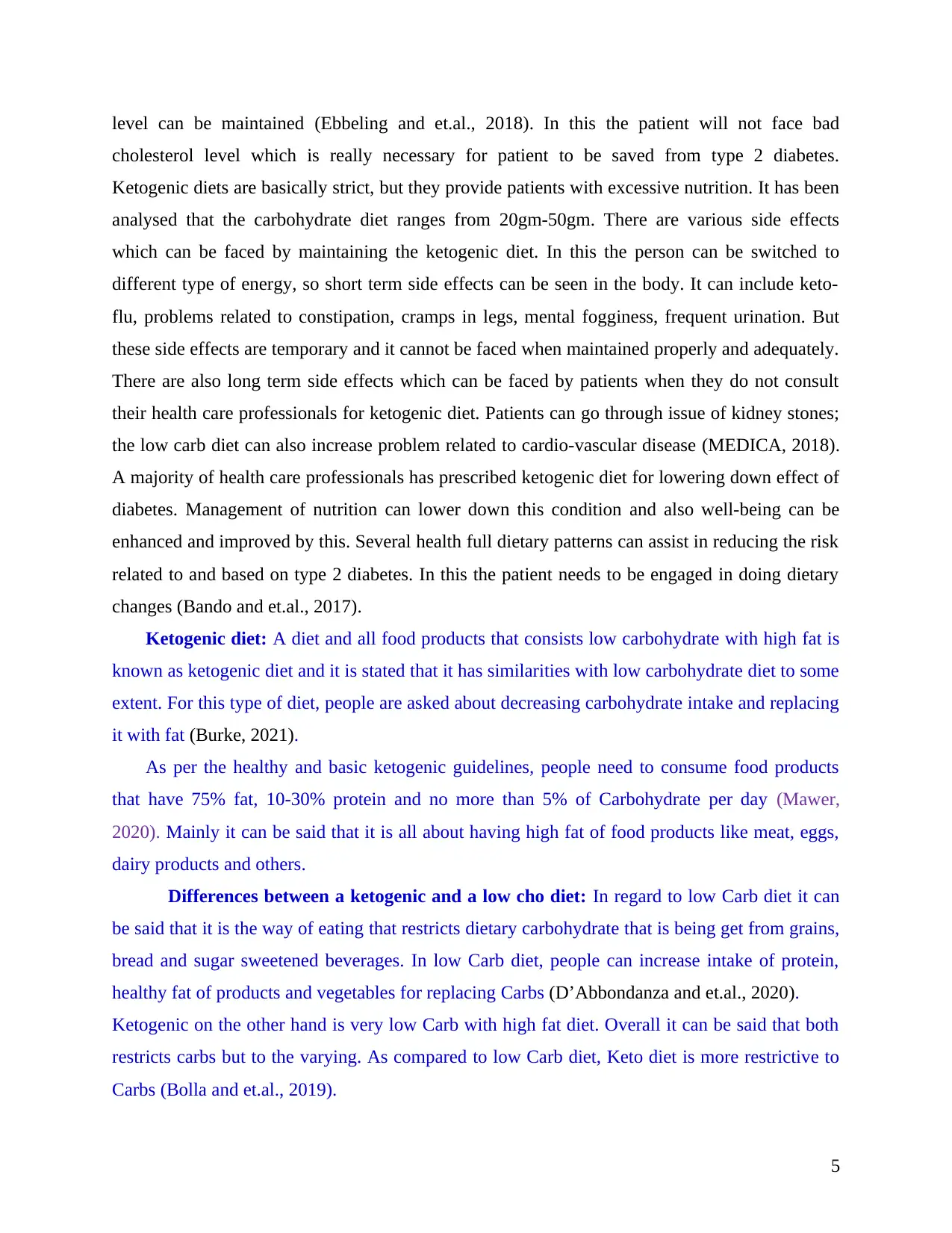
level can be maintained (Ebbeling and et.al., 2018). In this the patient will not face bad
cholesterol level which is really necessary for patient to be saved from type 2 diabetes.
Ketogenic diets are basically strict, but they provide patients with excessive nutrition. It has been
analysed that the carbohydrate diet ranges from 20gm-50gm. There are various side effects
which can be faced by maintaining the ketogenic diet. In this the person can be switched to
different type of energy, so short term side effects can be seen in the body. It can include keto-
flu, problems related to constipation, cramps in legs, mental fogginess, frequent urination. But
these side effects are temporary and it cannot be faced when maintained properly and adequately.
There are also long term side effects which can be faced by patients when they do not consult
their health care professionals for ketogenic diet. Patients can go through issue of kidney stones;
the low carb diet can also increase problem related to cardio-vascular disease (MEDICA, 2018).
A majority of health care professionals has prescribed ketogenic diet for lowering down effect of
diabetes. Management of nutrition can lower down this condition and also well-being can be
enhanced and improved by this. Several health full dietary patterns can assist in reducing the risk
related to and based on type 2 diabetes. In this the patient needs to be engaged in doing dietary
changes (Bando and et.al., 2017).
Ketogenic diet: A diet and all food products that consists low carbohydrate with high fat is
known as ketogenic diet and it is stated that it has similarities with low carbohydrate diet to some
extent. For this type of diet, people are asked about decreasing carbohydrate intake and replacing
it with fat (Burke, 2021).
As per the healthy and basic ketogenic guidelines, people need to consume food products
that have 75% fat, 10-30% protein and no more than 5% of Carbohydrate per day (Mawer,
2020). Mainly it can be said that it is all about having high fat of food products like meat, eggs,
dairy products and others.
Differences between a ketogenic and a low cho diet: In regard to low Carb diet it can
be said that it is the way of eating that restricts dietary carbohydrate that is being get from grains,
bread and sugar sweetened beverages. In low Carb diet, people can increase intake of protein,
healthy fat of products and vegetables for replacing Carbs (D’Abbondanza and et.al., 2020).
Ketogenic on the other hand is very low Carb with high fat diet. Overall it can be said that both
restricts carbs but to the varying. As compared to low Carb diet, Keto diet is more restrictive to
Carbs (Bolla and et.al., 2019).
5
cholesterol level which is really necessary for patient to be saved from type 2 diabetes.
Ketogenic diets are basically strict, but they provide patients with excessive nutrition. It has been
analysed that the carbohydrate diet ranges from 20gm-50gm. There are various side effects
which can be faced by maintaining the ketogenic diet. In this the person can be switched to
different type of energy, so short term side effects can be seen in the body. It can include keto-
flu, problems related to constipation, cramps in legs, mental fogginess, frequent urination. But
these side effects are temporary and it cannot be faced when maintained properly and adequately.
There are also long term side effects which can be faced by patients when they do not consult
their health care professionals for ketogenic diet. Patients can go through issue of kidney stones;
the low carb diet can also increase problem related to cardio-vascular disease (MEDICA, 2018).
A majority of health care professionals has prescribed ketogenic diet for lowering down effect of
diabetes. Management of nutrition can lower down this condition and also well-being can be
enhanced and improved by this. Several health full dietary patterns can assist in reducing the risk
related to and based on type 2 diabetes. In this the patient needs to be engaged in doing dietary
changes (Bando and et.al., 2017).
Ketogenic diet: A diet and all food products that consists low carbohydrate with high fat is
known as ketogenic diet and it is stated that it has similarities with low carbohydrate diet to some
extent. For this type of diet, people are asked about decreasing carbohydrate intake and replacing
it with fat (Burke, 2021).
As per the healthy and basic ketogenic guidelines, people need to consume food products
that have 75% fat, 10-30% protein and no more than 5% of Carbohydrate per day (Mawer,
2020). Mainly it can be said that it is all about having high fat of food products like meat, eggs,
dairy products and others.
Differences between a ketogenic and a low cho diet: In regard to low Carb diet it can
be said that it is the way of eating that restricts dietary carbohydrate that is being get from grains,
bread and sugar sweetened beverages. In low Carb diet, people can increase intake of protein,
healthy fat of products and vegetables for replacing Carbs (D’Abbondanza and et.al., 2020).
Ketogenic on the other hand is very low Carb with high fat diet. Overall it can be said that both
restricts carbs but to the varying. As compared to low Carb diet, Keto diet is more restrictive to
Carbs (Bolla and et.al., 2019).
5
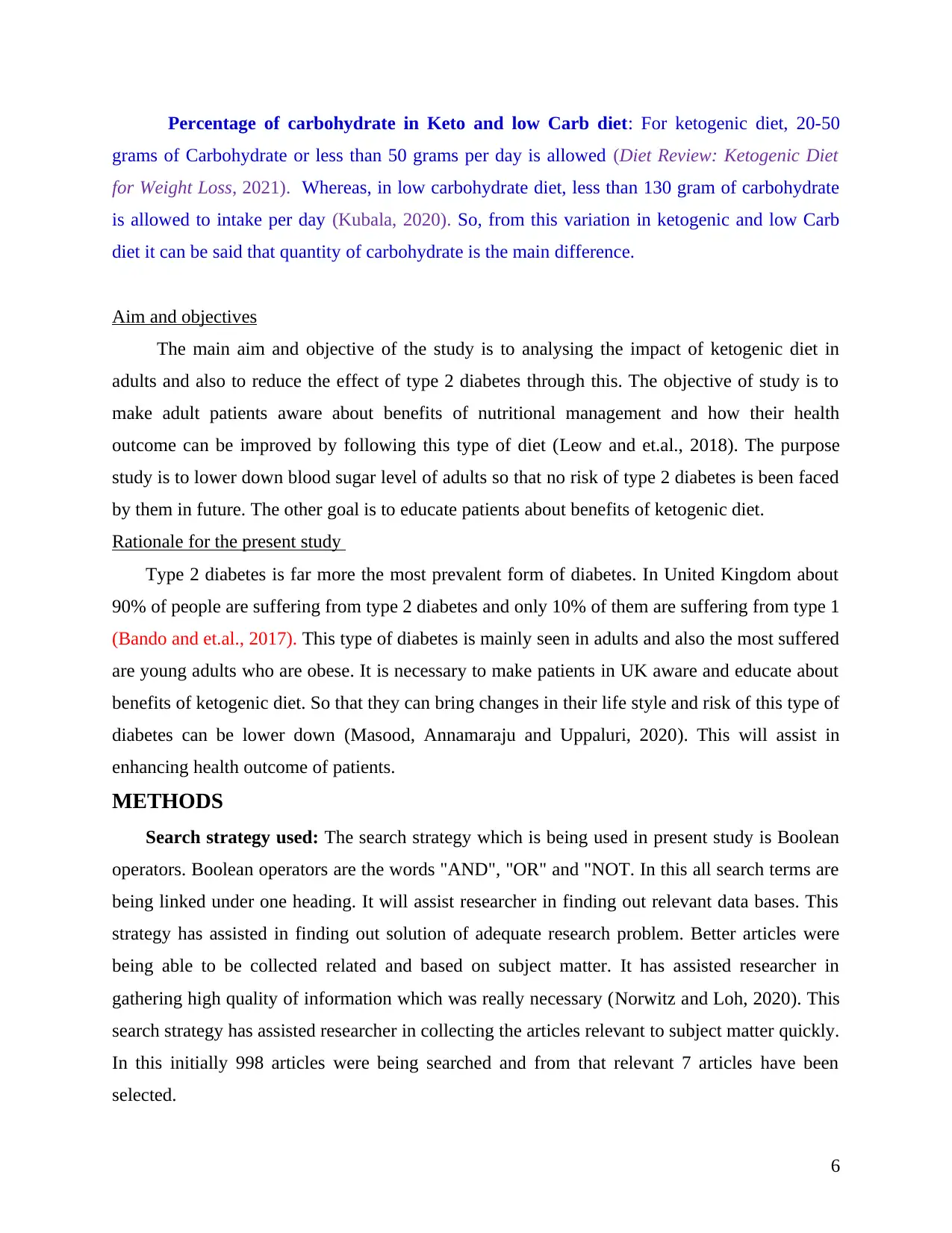
Percentage of carbohydrate in Keto and low Carb diet: For ketogenic diet, 20-50
grams of Carbohydrate or less than 50 grams per day is allowed (Diet Review: Ketogenic Diet
for Weight Loss, 2021). Whereas, in low carbohydrate diet, less than 130 gram of carbohydrate
is allowed to intake per day (Kubala, 2020). So, from this variation in ketogenic and low Carb
diet it can be said that quantity of carbohydrate is the main difference.
Aim and objectives
The main aim and objective of the study is to analysing the impact of ketogenic diet in
adults and also to reduce the effect of type 2 diabetes through this. The objective of study is to
make adult patients aware about benefits of nutritional management and how their health
outcome can be improved by following this type of diet (Leow and et.al., 2018). The purpose
study is to lower down blood sugar level of adults so that no risk of type 2 diabetes is been faced
by them in future. The other goal is to educate patients about benefits of ketogenic diet.
Rationale for the present study
Type 2 diabetes is far more the most prevalent form of diabetes. In United Kingdom about
90% of people are suffering from type 2 diabetes and only 10% of them are suffering from type 1
(Bando and et.al., 2017). This type of diabetes is mainly seen in adults and also the most suffered
are young adults who are obese. It is necessary to make patients in UK aware and educate about
benefits of ketogenic diet. So that they can bring changes in their life style and risk of this type of
diabetes can be lower down (Masood, Annamaraju and Uppaluri, 2020). This will assist in
enhancing health outcome of patients.
METHODS
Search strategy used: The search strategy which is being used in present study is Boolean
operators. Boolean operators are the words "AND", "OR" and "NOT. In this all search terms are
being linked under one heading. It will assist researcher in finding out relevant data bases. This
strategy has assisted in finding out solution of adequate research problem. Better articles were
being able to be collected related and based on subject matter. It has assisted researcher in
gathering high quality of information which was really necessary (Norwitz and Loh, 2020). This
search strategy has assisted researcher in collecting the articles relevant to subject matter quickly.
In this initially 998 articles were being searched and from that relevant 7 articles have been
selected.
6
grams of Carbohydrate or less than 50 grams per day is allowed (Diet Review: Ketogenic Diet
for Weight Loss, 2021). Whereas, in low carbohydrate diet, less than 130 gram of carbohydrate
is allowed to intake per day (Kubala, 2020). So, from this variation in ketogenic and low Carb
diet it can be said that quantity of carbohydrate is the main difference.
Aim and objectives
The main aim and objective of the study is to analysing the impact of ketogenic diet in
adults and also to reduce the effect of type 2 diabetes through this. The objective of study is to
make adult patients aware about benefits of nutritional management and how their health
outcome can be improved by following this type of diet (Leow and et.al., 2018). The purpose
study is to lower down blood sugar level of adults so that no risk of type 2 diabetes is been faced
by them in future. The other goal is to educate patients about benefits of ketogenic diet.
Rationale for the present study
Type 2 diabetes is far more the most prevalent form of diabetes. In United Kingdom about
90% of people are suffering from type 2 diabetes and only 10% of them are suffering from type 1
(Bando and et.al., 2017). This type of diabetes is mainly seen in adults and also the most suffered
are young adults who are obese. It is necessary to make patients in UK aware and educate about
benefits of ketogenic diet. So that they can bring changes in their life style and risk of this type of
diabetes can be lower down (Masood, Annamaraju and Uppaluri, 2020). This will assist in
enhancing health outcome of patients.
METHODS
Search strategy used: The search strategy which is being used in present study is Boolean
operators. Boolean operators are the words "AND", "OR" and "NOT. In this all search terms are
being linked under one heading. It will assist researcher in finding out relevant data bases. This
strategy has assisted in finding out solution of adequate research problem. Better articles were
being able to be collected related and based on subject matter. It has assisted researcher in
gathering high quality of information which was really necessary (Norwitz and Loh, 2020). This
search strategy has assisted researcher in collecting the articles relevant to subject matter quickly.
In this initially 998 articles were being searched and from that relevant 7 articles have been
selected.
6
⊘ This is a preview!⊘
Do you want full access?
Subscribe today to unlock all pages.

Trusted by 1+ million students worldwide
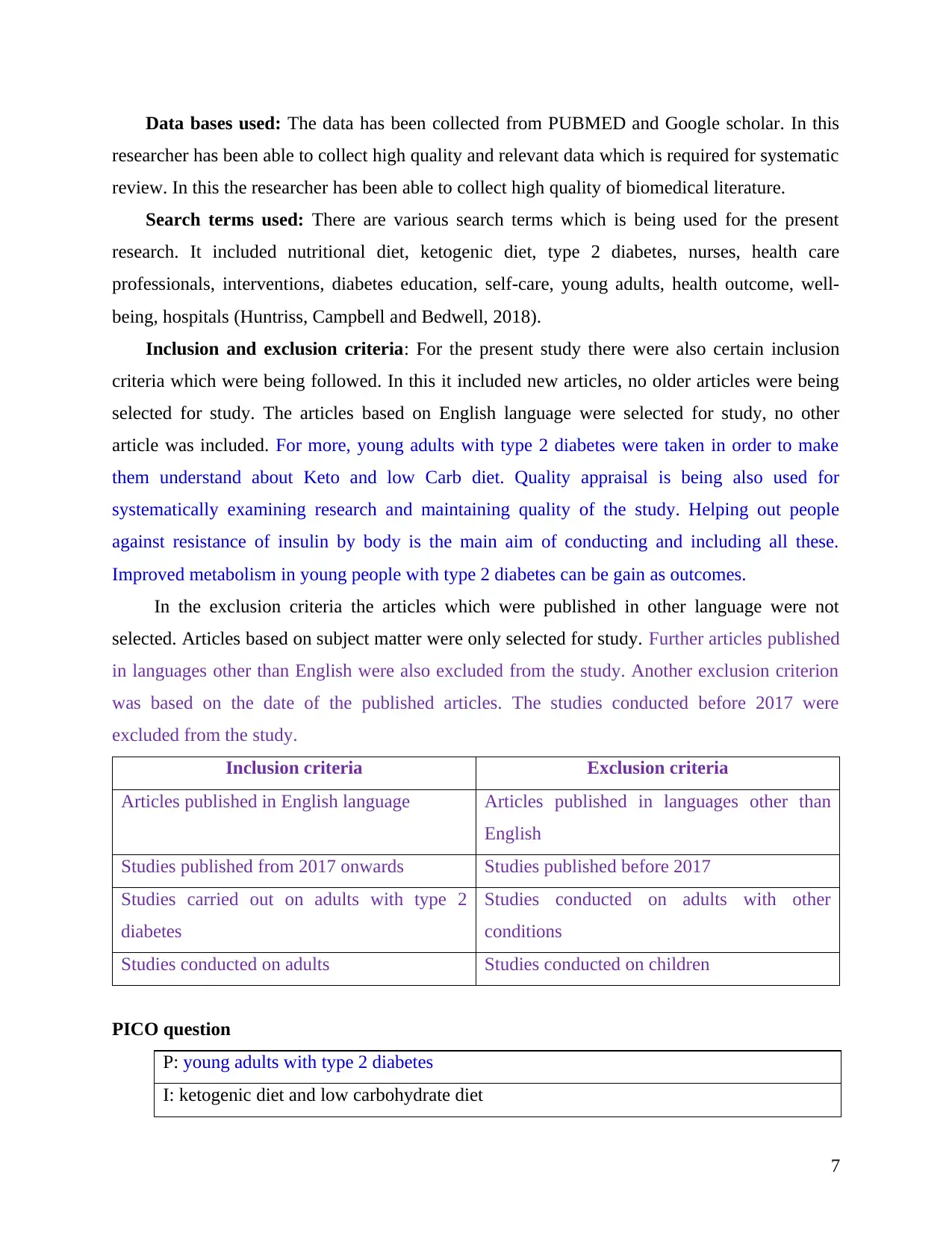
Data bases used: The data has been collected from PUBMED and Google scholar. In this
researcher has been able to collect high quality and relevant data which is required for systematic
review. In this the researcher has been able to collect high quality of biomedical literature.
Search terms used: There are various search terms which is being used for the present
research. It included nutritional diet, ketogenic diet, type 2 diabetes, nurses, health care
professionals, interventions, diabetes education, self-care, young adults, health outcome, well-
being, hospitals (Huntriss, Campbell and Bedwell, 2018).
Inclusion and exclusion criteria: For the present study there were also certain inclusion
criteria which were being followed. In this it included new articles, no older articles were being
selected for study. The articles based on English language were selected for study, no other
article was included. For more, young adults with type 2 diabetes were taken in order to make
them understand about Keto and low Carb diet. Quality appraisal is being also used for
systematically examining research and maintaining quality of the study. Helping out people
against resistance of insulin by body is the main aim of conducting and including all these.
Improved metabolism in young people with type 2 diabetes can be gain as outcomes.
In the exclusion criteria the articles which were published in other language were not
selected. Articles based on subject matter were only selected for study. Further articles published
in languages other than English were also excluded from the study. Another exclusion criterion
was based on the date of the published articles. The studies conducted before 2017 were
excluded from the study.
Inclusion criteria Exclusion criteria
Articles published in English language Articles published in languages other than
English
Studies published from 2017 onwards Studies published before 2017
Studies carried out on adults with type 2
diabetes
Studies conducted on adults with other
conditions
Studies conducted on adults Studies conducted on children
PICO question
P: young adults with type 2 diabetes
I: ketogenic diet and low carbohydrate diet
7
researcher has been able to collect high quality and relevant data which is required for systematic
review. In this the researcher has been able to collect high quality of biomedical literature.
Search terms used: There are various search terms which is being used for the present
research. It included nutritional diet, ketogenic diet, type 2 diabetes, nurses, health care
professionals, interventions, diabetes education, self-care, young adults, health outcome, well-
being, hospitals (Huntriss, Campbell and Bedwell, 2018).
Inclusion and exclusion criteria: For the present study there were also certain inclusion
criteria which were being followed. In this it included new articles, no older articles were being
selected for study. The articles based on English language were selected for study, no other
article was included. For more, young adults with type 2 diabetes were taken in order to make
them understand about Keto and low Carb diet. Quality appraisal is being also used for
systematically examining research and maintaining quality of the study. Helping out people
against resistance of insulin by body is the main aim of conducting and including all these.
Improved metabolism in young people with type 2 diabetes can be gain as outcomes.
In the exclusion criteria the articles which were published in other language were not
selected. Articles based on subject matter were only selected for study. Further articles published
in languages other than English were also excluded from the study. Another exclusion criterion
was based on the date of the published articles. The studies conducted before 2017 were
excluded from the study.
Inclusion criteria Exclusion criteria
Articles published in English language Articles published in languages other than
English
Studies published from 2017 onwards Studies published before 2017
Studies carried out on adults with type 2
diabetes
Studies conducted on adults with other
conditions
Studies conducted on adults Studies conducted on children
PICO question
P: young adults with type 2 diabetes
I: ketogenic diet and low carbohydrate diet
7
Paraphrase This Document
Need a fresh take? Get an instant paraphrase of this document with our AI Paraphraser
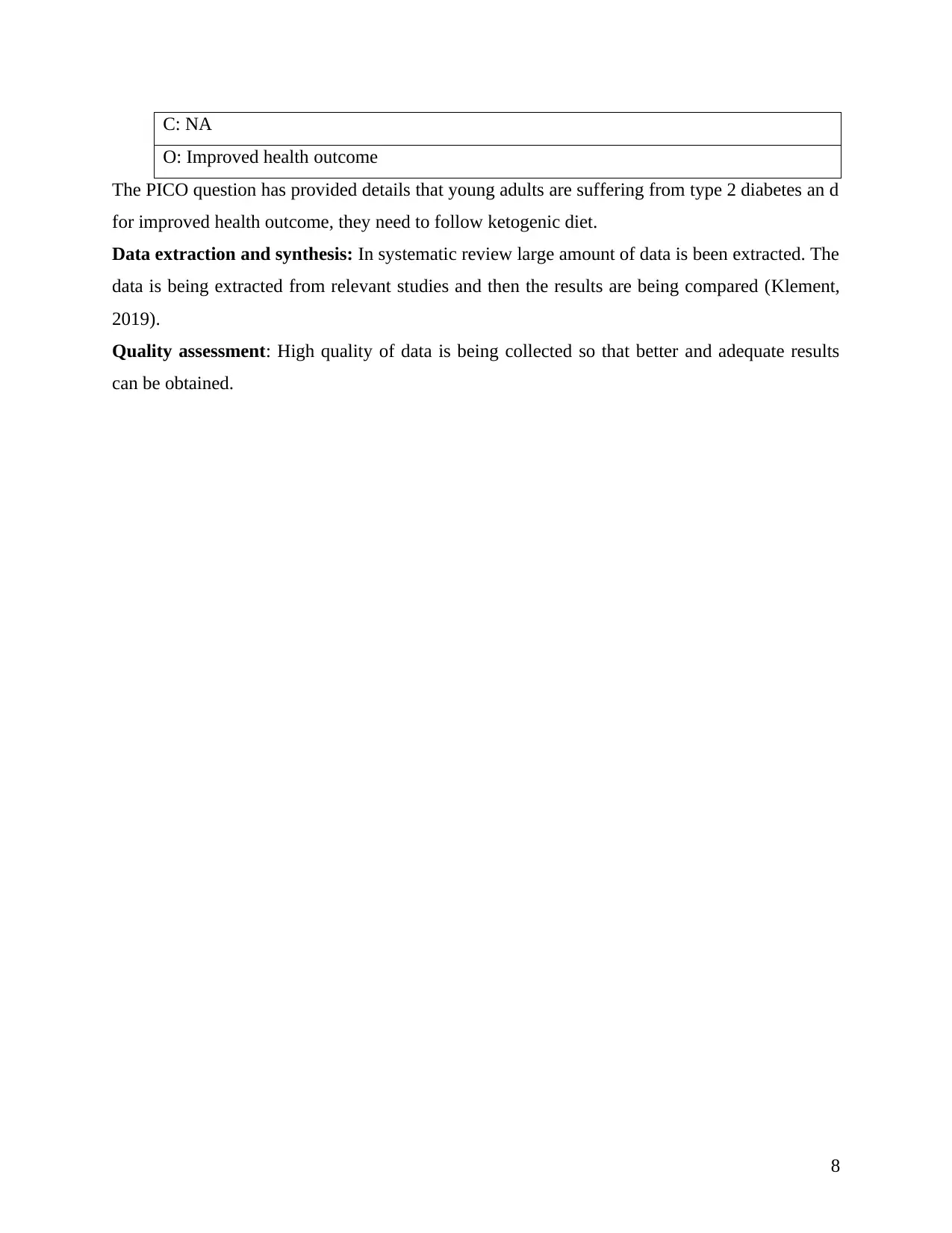
C: NA
O: Improved health outcome
The PICO question has provided details that young adults are suffering from type 2 diabetes an d
for improved health outcome, they need to follow ketogenic diet.
Data extraction and synthesis: In systematic review large amount of data is been extracted. The
data is being extracted from relevant studies and then the results are being compared (Klement,
2019).
Quality assessment: High quality of data is being collected so that better and adequate results
can be obtained.
8
O: Improved health outcome
The PICO question has provided details that young adults are suffering from type 2 diabetes an d
for improved health outcome, they need to follow ketogenic diet.
Data extraction and synthesis: In systematic review large amount of data is been extracted. The
data is being extracted from relevant studies and then the results are being compared (Klement,
2019).
Quality assessment: High quality of data is being collected so that better and adequate results
can be obtained.
8
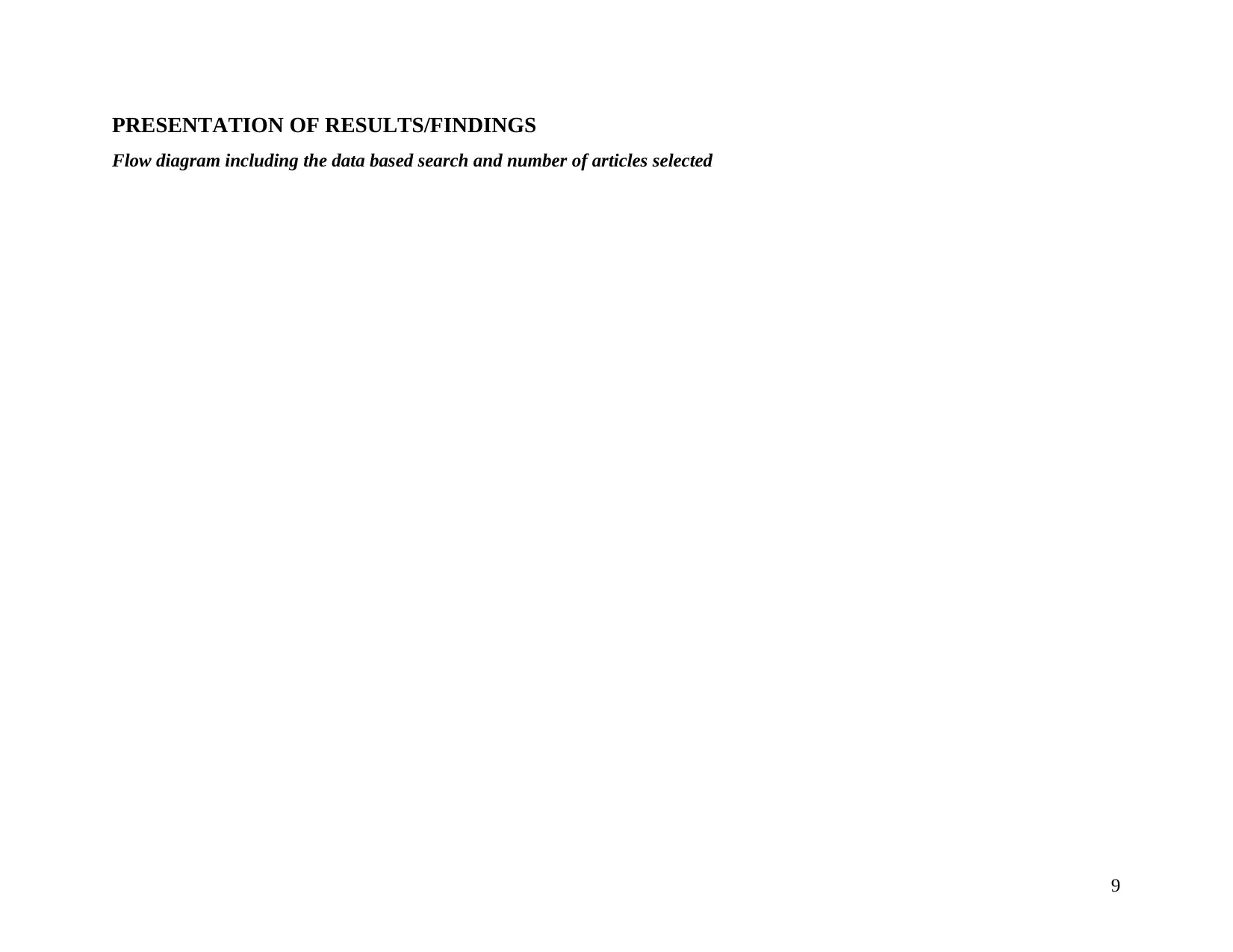
PRESENTATION OF RESULTS/FINDINGS
Flow diagram including the data based search and number of articles selected
9
Flow diagram including the data based search and number of articles selected
9
⊘ This is a preview!⊘
Do you want full access?
Subscribe today to unlock all pages.

Trusted by 1+ million students worldwide
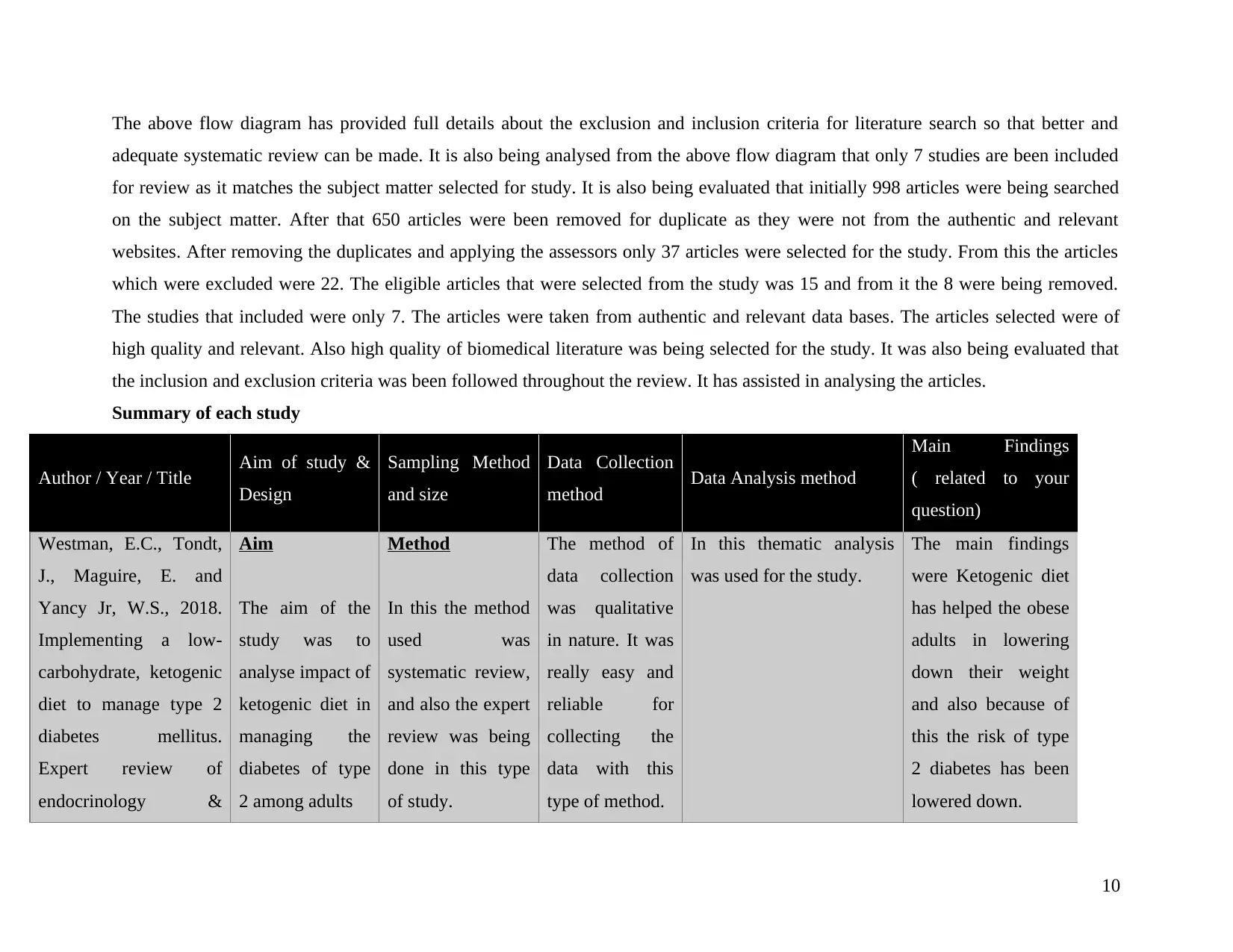
The above flow diagram has provided full details about the exclusion and inclusion criteria for literature search so that better and
adequate systematic review can be made. It is also being analysed from the above flow diagram that only 7 studies are been included
for review as it matches the subject matter selected for study. It is also being evaluated that initially 998 articles were being searched
on the subject matter. After that 650 articles were been removed for duplicate as they were not from the authentic and relevant
websites. After removing the duplicates and applying the assessors only 37 articles were selected for the study. From this the articles
which were excluded were 22. The eligible articles that were selected from the study was 15 and from it the 8 were being removed.
The studies that included were only 7. The articles were taken from authentic and relevant data bases. The articles selected were of
high quality and relevant. Also high quality of biomedical literature was being selected for the study. It was also being evaluated that
the inclusion and exclusion criteria was been followed throughout the review. It has assisted in analysing the articles.
Summary of each study
Author / Year / Title Aim of study &
Design
Sampling Method
and size
Data Collection
method Data Analysis method
Main Findings
( related to your
question)
Westman, E.C., Tondt,
J., Maguire, E. and
Yancy Jr, W.S., 2018.
Implementing a low-
carbohydrate, ketogenic
diet to manage type 2
diabetes mellitus.
Expert review of
endocrinology &
Aim
The aim of the
study was to
analyse impact of
ketogenic diet in
managing the
diabetes of type
2 among adults
Method
In this the method
used was
systematic review,
and also the expert
review was being
done in this type
of study.
The method of
data collection
was qualitative
in nature. It was
really easy and
reliable for
collecting the
data with this
type of method.
In this thematic analysis
was used for the study.
The main findings
were Ketogenic diet
has helped the obese
adults in lowering
down their weight
and also because of
this the risk of type
2 diabetes has been
lowered down.
10
adequate systematic review can be made. It is also being analysed from the above flow diagram that only 7 studies are been included
for review as it matches the subject matter selected for study. It is also being evaluated that initially 998 articles were being searched
on the subject matter. After that 650 articles were been removed for duplicate as they were not from the authentic and relevant
websites. After removing the duplicates and applying the assessors only 37 articles were selected for the study. From this the articles
which were excluded were 22. The eligible articles that were selected from the study was 15 and from it the 8 were being removed.
The studies that included were only 7. The articles were taken from authentic and relevant data bases. The articles selected were of
high quality and relevant. Also high quality of biomedical literature was being selected for the study. It was also being evaluated that
the inclusion and exclusion criteria was been followed throughout the review. It has assisted in analysing the articles.
Summary of each study
Author / Year / Title Aim of study &
Design
Sampling Method
and size
Data Collection
method Data Analysis method
Main Findings
( related to your
question)
Westman, E.C., Tondt,
J., Maguire, E. and
Yancy Jr, W.S., 2018.
Implementing a low-
carbohydrate, ketogenic
diet to manage type 2
diabetes mellitus.
Expert review of
endocrinology &
Aim
The aim of the
study was to
analyse impact of
ketogenic diet in
managing the
diabetes of type
2 among adults
Method
In this the method
used was
systematic review,
and also the expert
review was being
done in this type
of study.
The method of
data collection
was qualitative
in nature. It was
really easy and
reliable for
collecting the
data with this
type of method.
In this thematic analysis
was used for the study.
The main findings
were Ketogenic diet
has helped the obese
adults in lowering
down their weight
and also because of
this the risk of type
2 diabetes has been
lowered down.
10
Paraphrase This Document
Need a fresh take? Get an instant paraphrase of this document with our AI Paraphraser
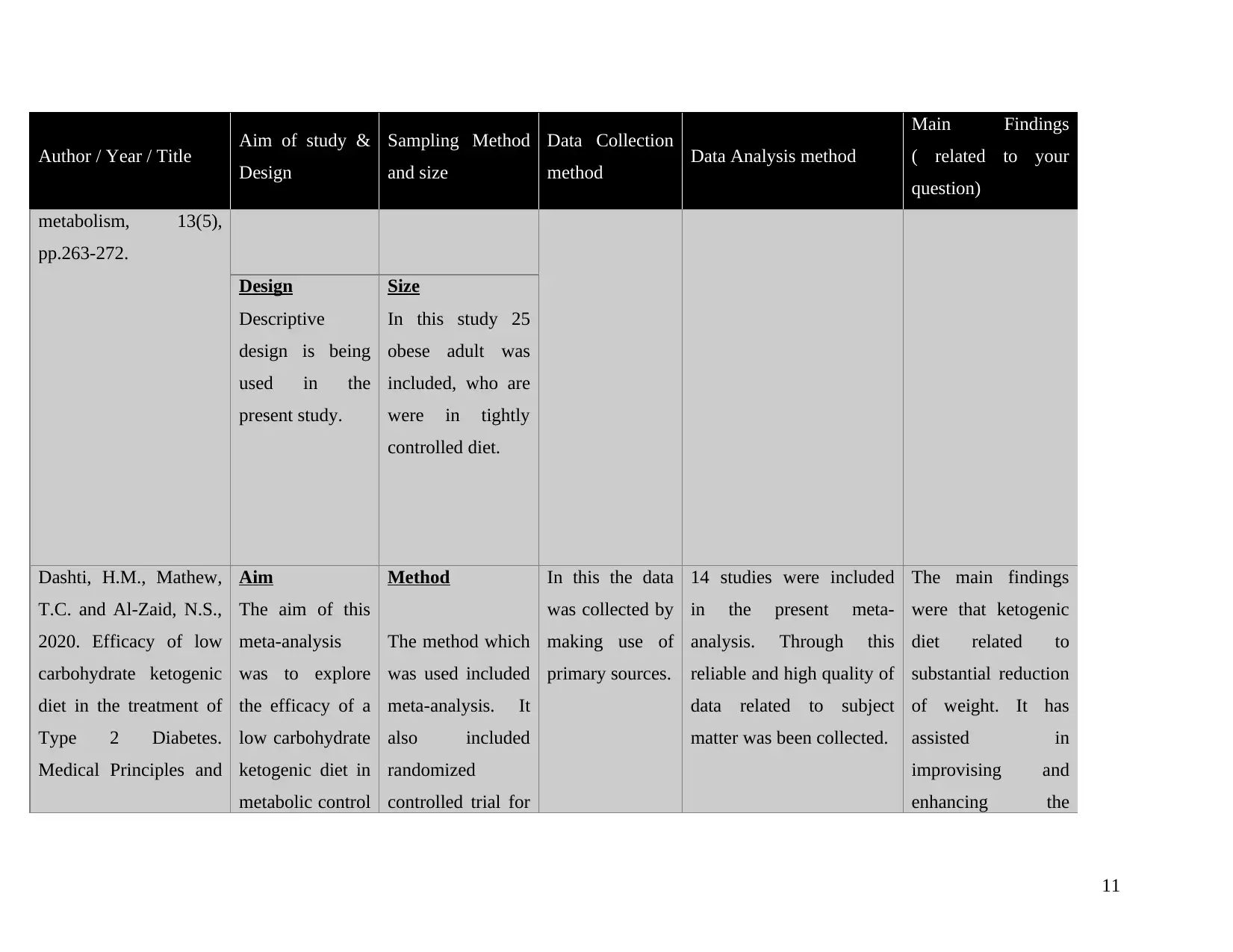
Author / Year / Title Aim of study &
Design
Sampling Method
and size
Data Collection
method Data Analysis method
Main Findings
( related to your
question)
metabolism, 13(5),
pp.263-272.
Design
Descriptive
design is being
used in the
present study.
Size
In this study 25
obese adult was
included, who are
were in tightly
controlled diet.
Dashti, H.M., Mathew,
T.C. and Al-Zaid, N.S.,
2020. Efficacy of low
carbohydrate ketogenic
diet in the treatment of
Type 2 Diabetes.
Medical Principles and
Aim
The aim of this
meta-analysis
was to explore
the efficacy of a
low carbohydrate
ketogenic diet in
metabolic control
Method
The method which
was used included
meta-analysis. It
also included
randomized
controlled trial for
In this the data
was collected by
making use of
primary sources.
14 studies were included
in the present meta-
analysis. Through this
reliable and high quality of
data related to subject
matter was been collected.
The main findings
were that ketogenic
diet related to
substantial reduction
of weight. It has
assisted in
improvising and
enhancing the
11
Design
Sampling Method
and size
Data Collection
method Data Analysis method
Main Findings
( related to your
question)
metabolism, 13(5),
pp.263-272.
Design
Descriptive
design is being
used in the
present study.
Size
In this study 25
obese adult was
included, who are
were in tightly
controlled diet.
Dashti, H.M., Mathew,
T.C. and Al-Zaid, N.S.,
2020. Efficacy of low
carbohydrate ketogenic
diet in the treatment of
Type 2 Diabetes.
Medical Principles and
Aim
The aim of this
meta-analysis
was to explore
the efficacy of a
low carbohydrate
ketogenic diet in
metabolic control
Method
The method which
was used included
meta-analysis. It
also included
randomized
controlled trial for
In this the data
was collected by
making use of
primary sources.
14 studies were included
in the present meta-
analysis. Through this
reliable and high quality of
data related to subject
matter was been collected.
The main findings
were that ketogenic
diet related to
substantial reduction
of weight. It has
assisted in
improvising and
enhancing the
11
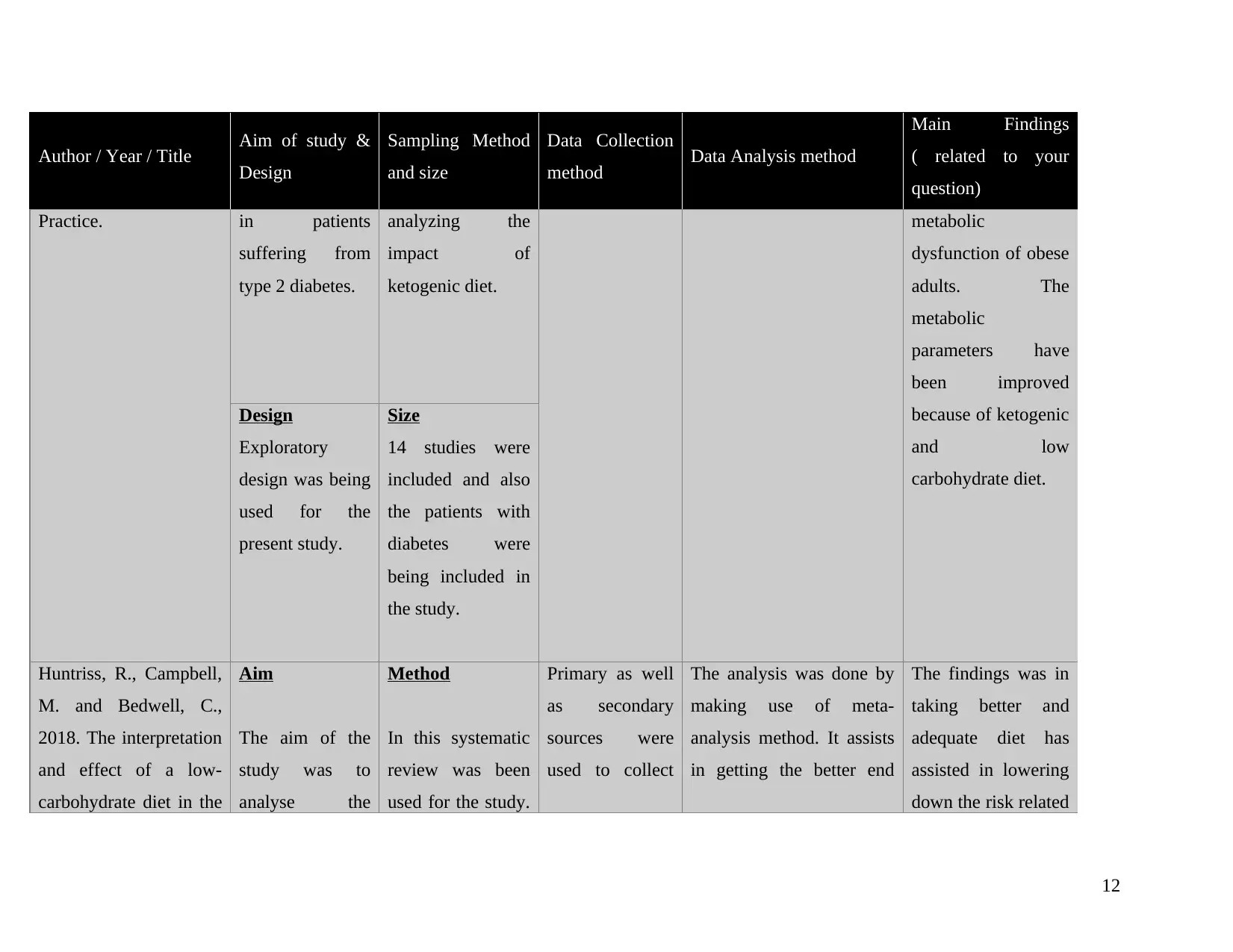
Author / Year / Title Aim of study &
Design
Sampling Method
and size
Data Collection
method Data Analysis method
Main Findings
( related to your
question)
Practice. in patients
suffering from
type 2 diabetes.
analyzing the
impact of
ketogenic diet.
metabolic
dysfunction of obese
adults. The
metabolic
parameters have
been improved
because of ketogenic
and low
carbohydrate diet.
Design
Exploratory
design was being
used for the
present study.
Size
14 studies were
included and also
the patients with
diabetes were
being included in
the study.
Huntriss, R., Campbell,
M. and Bedwell, C.,
2018. The interpretation
and effect of a low-
carbohydrate diet in the
Aim
The aim of the
study was to
analyse the
Method
In this systematic
review was been
used for the study.
Primary as well
as secondary
sources were
used to collect
The analysis was done by
making use of meta-
analysis method. It assists
in getting the better end
The findings was in
taking better and
adequate diet has
assisted in lowering
down the risk related
12
Design
Sampling Method
and size
Data Collection
method Data Analysis method
Main Findings
( related to your
question)
Practice. in patients
suffering from
type 2 diabetes.
analyzing the
impact of
ketogenic diet.
metabolic
dysfunction of obese
adults. The
metabolic
parameters have
been improved
because of ketogenic
and low
carbohydrate diet.
Design
Exploratory
design was being
used for the
present study.
Size
14 studies were
included and also
the patients with
diabetes were
being included in
the study.
Huntriss, R., Campbell,
M. and Bedwell, C.,
2018. The interpretation
and effect of a low-
carbohydrate diet in the
Aim
The aim of the
study was to
analyse the
Method
In this systematic
review was been
used for the study.
Primary as well
as secondary
sources were
used to collect
The analysis was done by
making use of meta-
analysis method. It assists
in getting the better end
The findings was in
taking better and
adequate diet has
assisted in lowering
down the risk related
12
⊘ This is a preview!⊘
Do you want full access?
Subscribe today to unlock all pages.

Trusted by 1+ million students worldwide
1 out of 28
Related Documents
Your All-in-One AI-Powered Toolkit for Academic Success.
+13062052269
info@desklib.com
Available 24*7 on WhatsApp / Email
![[object Object]](/_next/static/media/star-bottom.7253800d.svg)
Unlock your academic potential
Copyright © 2020–2026 A2Z Services. All Rights Reserved. Developed and managed by ZUCOL.





